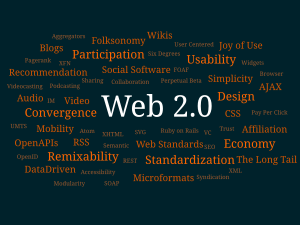 Image via Wikipedia
Image via Wikipedia
Today, a new style of commercials, TV shows and movies has emerged. This style seems to be a deliberate effort to relate to the new aspects of Web 2.0. The Web 2.0 revolves around user-generated content. Users can easily create and upload their own web blogs, web cam videos, pictures, articles, music, music videos, and all sorts of media. They have gained a personal connection with the web because of their involvement. Hence, a new style in commercials, TV shows and movies which involves these Web 2.0 aspects is now being used by some professionals to make their content more relatable to the audience.
An example of this style is used for Windows' recent "I'm a PC" commercials. Not only does it personalize PCs with the "I am a PC" slogan, but it also connects to modern consumers by appealing to the user-generated style commonly used on the web. Another example would be the movies My Suicide, which revolves around the use of a personal webcam and the whole concept that even an amateur can produce something for a large audience to view. However, My Suicide does not appear as a low-quality or amateur-level film; it also contains high-quality editing and advanced techniques.
This specific style will continue to be used by some professional commercials, TV shows and movies so long as this Web 2.0 craze remains a dominant component of our culture. However, it will only remain one of many professional styles; the overall quality and approach of all commercials, TV shows and movies will not lower. In fact, they may become even more high-tech, high-quality and professional as more and more high-tech software and technology are developed, and more people are educated on how to use them. This increase in quality and professionalism will most likely carry over to user-generated content on the web as well. As more and more high-tech software and technology are developed, and more people are educated on how to use them, the quality of user-generated content on the web will increase.
Find a news article and write down tags you would use to define what the article is about. Now goto Digg or another tagging site and see how others have tagged it. What did you learn from the differences or similarities in tagging?
Article: Seesmic's Web App Now Does Threaded Twitter Conversations
Possible tags: Twitter, Seesmic, web applications, internet, web, social media, new
Given tags: Seesmic, software, trending, twitter, twitter client, web application
They both contain key words. However, the given tags tend to be more specific than the ones we thought of when simply skimming the article. In hindsight, a tag like "internet" probably wouldn't be included because it is assumed that if a person is interested in Twitter, then he or she probably understands that Twitter is an online service.
Why is transparency such an important concept in the Social Media world? Is it MORE or LESS important in the offline world? Why?
The issue of transparency is important in the social media world because it is easy and convenient to lie with the anonymity of the internet. If a writer wants to be taken as a credible source of information, readers have to know if they have alternative motives.
Transparency is more important in the online world than the offline world. When people are using the internet, they generally are using it as a resource for information in some way. This is different than offline media. For example, when people are watching commercials, they already understand that the intention is to advertise. When reading a blog post, though, the reader is more inclined to assume that the writer is being objective to a certain extent. It's just more clear to identify purpose in offline media rather than online media. Expecting a sales-pitch versus expecting general information will cause variation in one's ability to sense transparency: one is more susceptible to the dangers of transparency online rather than offline.
![Reblog this post [with Zemanta]](http://img.zemanta.com/reblog_e.png?x-id=09cc336f-46ca-4192-a7a1-59a730c181b0)

![Reblog this post [with Zemanta]](http://img.zemanta.com/reblog_e.png?x-id=8bb3753d-f52e-49d5-b7ad-93a59f85d49c)
![Reblog this post [with Zemanta]](http://img.zemanta.com/reblog_e.png?x-id=7885c4f9-af11-4a15-a4e4-086991619498)

![Reblog this post [with Zemanta]](http://img.zemanta.com/reblog_e.png?x-id=360ade24-2df1-40ef-a04c-1b094219ae75)


